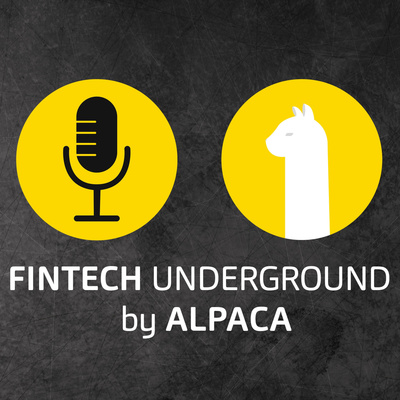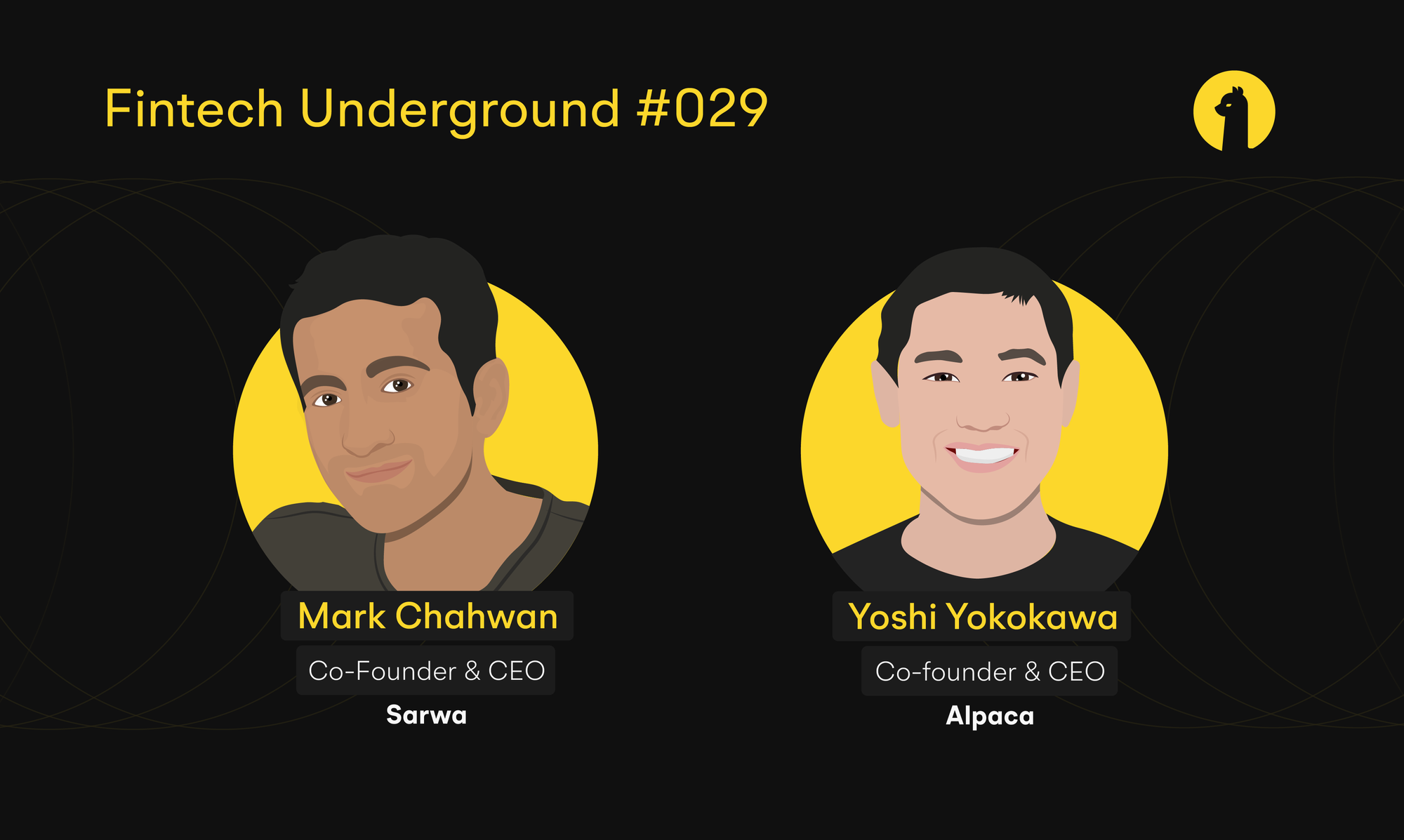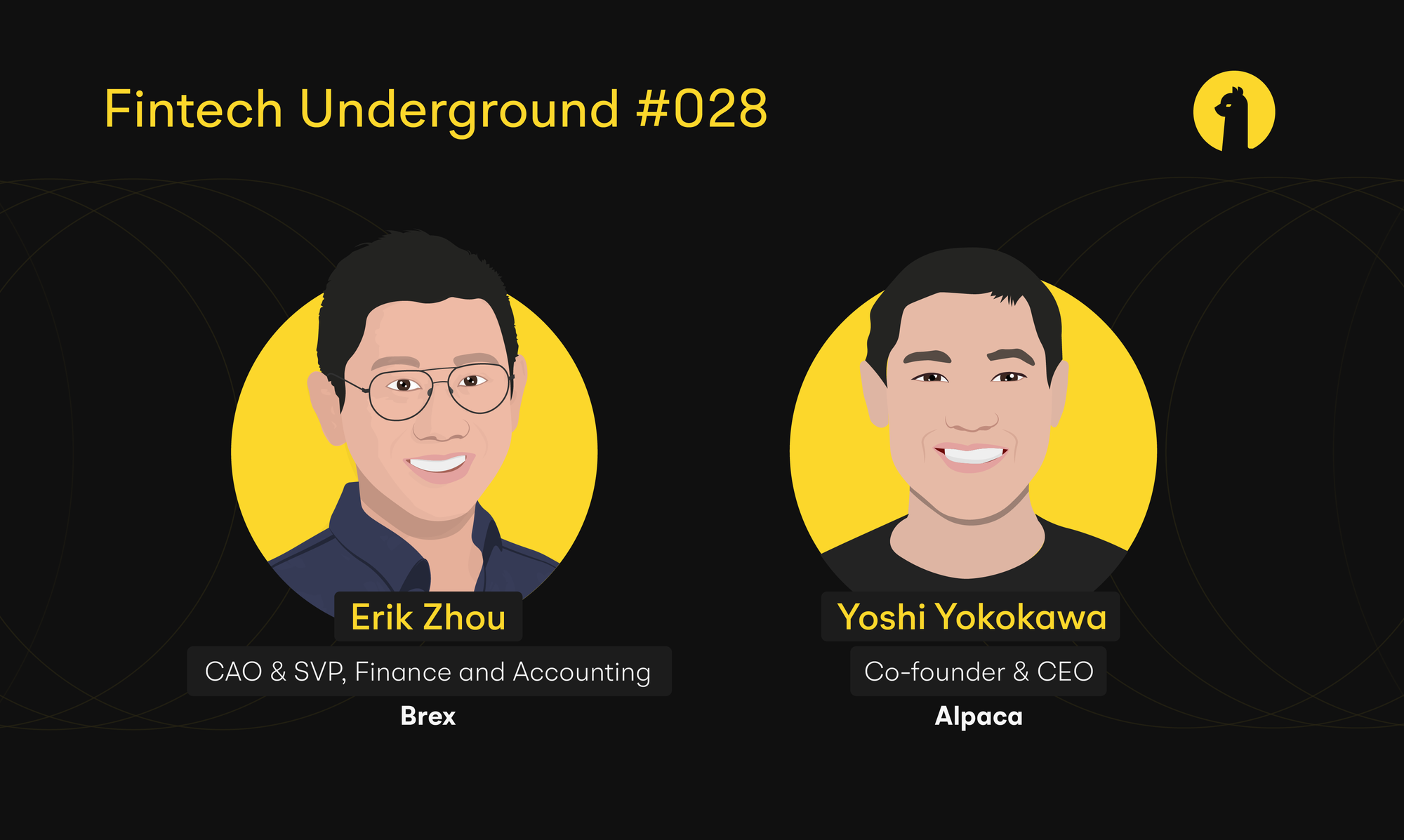
Any opinions expressed are opinions of the host and their guests. Alpaca Securities LLC does not recommend any specific investments or investment strategies.
Fintech Underground by Alpaca is a podcast devoted to all topics related to stock trading and APIs. From trading with algorithms or connecting apps or building out services, we aim to bring light to the different corners of Fintech.

TL;DR
On the eleventh episode of Fintech Underground by Alpaca, we interviewed Cynan Rhodes. As the CEO of IXily, a transaction network for trade ideas and tools services, Cynan shares how he transitioned from the technology industry to financial services. From there we discuss self-directed investing, IXily’s primary market, product development, fintech megatrends, and more.
Summary
IXily is a platform that facilitates the execution of trade ideas. Offering tools to build optimized one click trade ideas to execution workflow and a single API for connectivity to brokers globally, it enables trade ideas and tools services to turn their own offerings into connected end-to-end investment services. Recently we were incredibly lucky to speak to Cynan Rhodes, one of the cofounders of IXily. In addition to their developer dashboard, their SDKs and mobile app make integration with IXily flexible and seamless.
Find the full transcript below. To hear more CEO/Founders of the most interesting Fintech companies speak about their experience in the industry, check out our other episodes below.

Full Transcript
Jason: [00:00:00] Welcome to FinTech Underground by Alpaca, a podcast devoted to stock trading API. From trading with algorithms to connecting apps, to building out services, Alpaca is built for developers and traders. And with that being said, let's get started.
Hello everybody. Welcome back to FinTech Underground by Alpaca. In each episode, we aim to explore different areas within FinTech. Today, we are incredibly lucky to have Cynan, one of the co-founders of IXily, an open finance platform to build the future of investing. Offering a single API for connectivity to the global investing ecosystem, IXily enables FinTech applications and financial service providers to build and deliver next generation investing services.
And in addition to the web dashboard, IXily released a mobile app that allows investors and users seamless mobile access. With Yoshi, CEO and co-founder of Alpaca here to host, we dive deep into Cynan's background, IXily, and the FinTech ecosystem as a whole. So let's get started.
Yoshi: [00:01:00] Hi Cynan, how are you? Thank you very much for joining the call.
Cynan: [00:01:02] Great, thank you. Good to meet you, Yoshi.
Yoshi: [00:01:04] Yeah, there are many things that we're going to talk about and firstly, really, thank you for taking your time to appear on our podcast today, FinTech Underground.
Firstly, you are the co-founder of IXily. Can you give a brief summary of what IXily does?
Cynan: [00:01:19] Yeah, iXily is a platform and we facilitate the execution of trade ideas. Practically, what it means is that we, we kind of connect various services, various tools, and kind of trade idea related services with brokers. And we make that process of executing an idea as efficient and easy as possible to be executed at the broker.
Yoshi: [00:01:41] Got it. And, you know, you started IXily with a couple other friends. How did you come up with this idea and you know, what pushed you to start IXily?
Cynan: [00:01:52] It goes back to solving our own problem. I guess I started getting pretty serious about my own personal investing about 10 years ago.
And yeah, you just start with kind of a small path and you make mistakes. And then as your experience grows, start to do more things. I was starting to make some money and started then, some family members as well had trading accounts and a few friends. And not that it was that big or anything, but just suddenly it had multiple accounts and it gets really hard to manage multiple accounts actively.
The logical thing then is okay, well, you know, let's try and automate some of these things we've started building out. Broker connections, not for any other reason than our own purpose, just to make our life easy. And then probably about three, four years ago, we sort of continued to do quite well. And we're thinking, okay, you know, can we take, make something more of this and maybe turn it into a proper - do we launch a hedge fund or what kind of product have we got?
And we looked for a period of time. We looked if we could start a fund, but it's so horrendously regulated, complex, expensive, and access is kind of restricted to having the right kind of experience, shall we say. It was, very difficult, but we still felt our approach of having managing all these accounts via API actually had some value and ultimately would be a better solution for managing money, but we sort of dismissed starting our own fund.
We came to the conclusion that there were definitely better organizations and people to kind of solve that problem, if you'd like. And we really started to focus on the API itself. Like the connection was to the broker, the API methods we offered, how we would manage the money itself, and could we open that API up as a platform to enable more people to trade their money however they want to do it? In a way that was probably more professional than, say, just doing a simple kind of click a button to buy one of one Microsoft or one Square or something like that. So it's sort of an evolution over a period of time to solve our own problems.
Yoshi: [00:03:49] Got it. So who are the main champion users of your platform now?
Cynan: [00:03:54] I guess I'll start, I mean, we're still very much in beta, even after all this time. So it's a very closed beta. We have a number of investors who have quite similar problems, but at a much bigger scale, as in that they're kind of much more professional, bigger money, and we are now basically solving their problems.
And we start to get into a proper use case. We have basically a signal provider who wants to generate those signals and concentrate on that problem and be able to automate it, uh, sort of push those signals out to multiple different regulated parties. So one signal is going out literally to about seven different regulated funds, who then permission to be able to place the trade on that kind of money. So that's, you know, we're solving that problem for our investor and actually, we have another investor who is a more traditional wealth manager who runs managed accounts, and we provide a similar structure for them as well.
And that's kind of really where we're at. We, we're still a small company and we're very conscious of solving those particular problems before we open it up to the world, I guess.
Yoshi: [00:05:01] Understood. Now, you know, changing the topic a little bit, you being in the tech industry with good experience and of course being at the bank as well in the past, what was it like moving from the pure tech industry to the financial services related industry? Did you have some steep learning curve of doing that or was it not really considering the focus of what you're doing?
Cynan: [00:05:29] I don't think there's any, let's say there's no learning curve, but it's, you know, I've been building tech products of one form for a long time. Uh, I sort of originally originally in motor sport of all things actually, I sort of worked in Formula One circles for a number of years and then e-commerce as well.
And then, then a bit of banking and mostly for my own kind of entrepreneurial things. That's always my preference and, and occasionally had to dip into the world of having someone to pay the bills. But I don't really differentiate between the industries at all. It's still code. You're still trying to solve a problem. It's still the same process. So it's easy to adjust.
Yoshi: [00:06:07] That makes sense. And you are from Australia, I suppose. And then you're in London right now. And, you're also working with no user base. Global basis.
How are you thinking about targeted users and the kind of primary market that you're focusing on, if you have any?
Cynan: [00:06:26] The market is very broad, really, and it's definitely global. I guess it goes back to what we do kind of just to kind of shape that a little bit more.
I mean, we look at sort of the retail investment world as, as really in two distinct sides, if you'd like, you've almost got the idea sell side, which is generating trade ideas or helping investors to understand or to manage money. And I mean, that really is a whole wide variety of services.
I mean, it's everything from low code, no-code services, signal providers, alternative data sets, fundamental analysis. It's so broad, but still at the end of the day, all those services are really there to help an investor make decisions about how they will then manage their own. And obviously that's gone through tremendous growth in the past, particularly the past 18 months or so again, given a nice nudge by COVID over the last year.
And then the second side is the execution, as in the brokers. So most companies that we talk with, it's quite binary. They sit in one or two of those kinds of camps, if you'd like. So they're either typically new products generating or helping trade ideas, or they're a broker, and it's very much of what we do is, is where that kind of glue to join them together.
So, yeah, it's, it's incredibly broad, really. It's a very big market out there and it's amazing who you end up speaking to as well. People from all sorts of parts of the world, who just happened to have a good idea or a good service, that actually deserves to help people really, help people trade their money.
Yoshi: [00:08:06] You say you're working with a few beta customers. So you know, as you have multiple co-founders, what is your specific focus among the founders? What is the day like in coding course, like, you know, coding to the, talking with the users, discussing with the team?
Cynan: [00:08:23] There's three core founders and two, a commercial and on the tech end we have another four developers as well, who are full time, and then a couple who are part-time as well. So we're still a very early stage company and we're still very development heavy, as in the focus, day-to-day focus is always development.
It's a type of product where it's not a “release early and break things” kind of product. It is a product that needs to be right before it can be put out into the market. As in, you know, this is people's money, potentially it's financial, it's a regulated industry. It has to be the right product before we can really start to scale.
Yoshi: [00:09:07] I think that that really makes sense because we are really building the product, getting a few customers ready and it's all about iteration and product market fit, like what features should be prioritized. And it's always this kind of brainstorming program. I feel like nobody really knows what is the best feature that's going to stick and scale. So, how has been the journey? Because of course you started with your own idea, solving your own problem. Now, you're also involving the customers and that's a little bit of a different thought process, right?
So you know, how has the journey been like, you know, kind of switching the gears of your brain and your team's brains to utilize that into the product development?
Cynan: [00:09:55] It has been very challenging in a number of ways. One, it's been quite difficult to even explain what we do, particularly over two, three years, even as our idea has evolved, it has been to communicate that.
And I think even going back to probably two years ago, our thought was "Where's the money, you know, where is it?" It's in the more institutional side, it's in professional services, it's in wealth management, the bigger amounts of money, like, that whole industry deserves to be transformed. How can we do it?
And because there's more money there, we thought, okay, this is the opportunity for us to exist as a business. And that was absolutely a struggle. I mean, from just resistance, everywhere, the industry, individual companies, potential clients, that's every conversation you'd have would be a negative one.
And it was, I guess, quite depressing after a while. You think you've got something good and you feel you can bring a good product, but actually nobody else thought that for a long time. And then the past year definitely changed everything. The whole kind of retail explosion. Absolutely. It changed everything for us.
We saw so many new products like quality apps and products, which have been released in 18 months, which are genuinely in the interests of retail investors and also the brokers of all types have now gone from being resistant to retail money. And I say that that's particularly the more traditional brokers.
We're just not particularly interested, but they have now kind of switched to say, actually, you know, now we're prepared to engage. So that, on both fronts, has made our conversations so much easier. And only in the last six months we'd have conversations, particularly with the startups that were trying to create their own businesses, which had a genuine need, to say, how can we connect our product to those brokerage accounts.
And then suddenly, I mean, it flipped overnight. I mean, it really did. Suddenly everything was a positive conversation and everybody understood the complexities and just the difficulties of trying to make all this plumbing work and trying to engage particularly traditional brokers and, and the compliance and the nuances of sometimes they're, they're pretty difficult APIs, you know, to get all this working say overnight, less than six months ago, we found that product market fit and we had to pitch slightly differently, but it just flipped instantly, which then suddenly you go from every conversation being negative to every conversation being a pretty positive one. We all kind of took a sigh of relief after that. It became pleasurable to talk to people.
Yoshi: [00:12:26] In terms of the product market fit, do you want to share a little bit more specifics? You know, what you found out - and do you want to explain how you're tackling that now?
Cynan: [00:12:36] Yeah, sure. One thing which has really resonated is that we see a lot of analogies between the retail investing world and e-commerce solutions. And we call it the shopping basket effect. Now that really, I mean, it's, and it's all about efficiencies, essentially, and I have to ask a couple of basic questions and that's how many individual steps does it take to go from an idea that someone has generated on anything, right?
A content site or, or even an algo? Like how many steps does it take to get that into your trading account? And realistically, most trading still happens in a broker app or, you know, broker website. So it's still all a little bit clunky, you know, whether you have to get your app, your phone out, log into your app, or, you know, click on a different tab.
It's all still a little bit clunky, particularly when compared to the efficiencies of a shopping basket. So we think it can be kind of improved, essentially. The view is that if we can make that process as efficient as possible, minimize the number of clicks, minimize the time that it takes to go from idea to execution, then everybody benefits. The broker benefits because of increasing flow, ie increase in sales of product.
The service provider providing the ideas or the service, they always benefit because the ability to execute on their product or with their product, it just enriches their own product. And they keep the user on their site or their product. And ultimately the investors benefit; they get a better product they're more likely to use.
And that goes back again to, like, Shopify came out with a stat a few years back on how many shopping baskets were abandoned and you think, how many trade ideas effectively become an abandoned shopping cart? And every investor has a long list of should've, could've would've, you know, like I should've bought that stock then, or I missed the moment or whatever, but what really matters is that small, incremental improvements throughout this whole process of coming up or having an idea generated, and getting that into the brokerage account can be to the benefit of all parties. And we only need to nudge that needle just a little bit. And it's just that transaction volume is quite substantial that we can have a business by improving that for everybody
Yoshi: [00:14:52] Compared to e-commerce, I think I thought about this kind of concept in the past personally as well, before launching this API first brokerage.
I feel like e-commerce, you are basically spending money in exchange of buying items instead of going back and forth. And therefore there's a thing like, you know, brokerage account, that it's basically like creating another bank account essentially like, KYC, know your customer information to a bunch of the anti money laundering checks and stuff like that.
As you know, big kind of concept difference if we compare it to e-commerce in my opinion. But how are you thinking about that? You know, when you're connecting those things involves a lot of compliance aspects of it, much heavier than e-commerce. What are your thoughts on that?
Cynan: [00:15:41] The first thing is, I mean, you, as the broker, you kind of take the burden of that compliance, as in it's still that user, it's their account. And you have taken them through the process of KYC and AML.
I mean, that's a problem that you are solving and not us. I mean, we are even with connecting to all the services, it's always that investor who is executing the trade. Like it's still their responsibility, it's their account. They're the ones who are always initiating that trade.
It can't be anybody else doing that for them. And the rules are subtly different in different countries, but it's still, that has, that's kind of a really critical sort of component to it all. I think how these other services are permissioned is really, really important. So, and this is where the brokerage industry has taken time to adapt.
And it's a slow process. Most brokerages are not really set up to connect to all the modern applications that are out there. Just a different mentality. And their APIs mostly were written initially say 20 years ago and okay, they might be maintained, but they're still often structurally, they're just not, they don't have modern sort of token based, uh, authentication where you can define scopes or allow for third-party apps that that might be submitting trades on a user's behalf, these sort of things.
It's a learning process for traditional brokers to do business this way, for sure. We do see that the modern brokers, any kind of, include Alpaca in that because you offer OAuth straight out of the box, right.
And so everyone that we speak to who provides some kind of service, like almost all, have integrated with your API, just because it's so easy. And that's the key, like the brokers that are just doing well, are offering easy services to integrate with. Not all brokers are like that.
So if we go back to the regulatory side of things, then the other thing is open banking and open data are really big movements, and particularly open banking.
I mean, it's quite big in the UK and that in many ways has set the precedent for a lot of things, which will probably come into open finance. I mean open finance as a kind of a general thing is not regulated in the same way yet, but who knows what the next few years will bring? But it does certainly bring a process of linking the expectations of the user, even the desire of the user to be able to connect an account and to be able to transact in that similar way to open banking. You know, that will be driven by what they do with their bank account, they might also want to do with their brokerage account. And they get used to seeing data in, on other sites other than their bank.
Yoshi: [00:18:16] Yeah, that makes sense. I think that we looked at like, for example, the company like TradeIt, which is now acquired and part of TradingView to the tradable that was, you know, UK based. Like now Jannick is doing the public and Plaid these, I think like, you know, coming up with a broker API, which of course is not sending the orders, but basically more of the mint type of putting clean the data about the positions.
I think like, you know, I don't know if it's open banking, but trying to have those brokers information so that the ecosystem of the developers can build on top of it. I feel like that direction is definitely something that, of course, we believe in. And we want to kind of make it a smoother process, but I agree that there is a lot of compliance and actual movement of money and securities problems, and actually opening the accounts and having those things. That's something that we definitely share the passion about because those are the things that we face as a problem every single day at Alpaca too.
Cynan: [00:19:14] Yeah. So I guess, a couple of points, I mean, one, so TradeIt, we really liked TradeIt. I think they were probably disappointed that the company didn't fulfill its potential. I mean, I think it was maybe fractionally early, but actually it was really good, it was a good product that was well received as well. And everybody we've spoken to brings TradeIt up. And I think for us, we have a similar solution, but a different architecture.
I think what we've avoided is we avoid account opening. That becomes your problem. So we start with assuming that the user already has a brokerage account. We don't transfer money. We're the ones, we will handle a trade order instruction, but we're not doing the executing. I mean, that's, that's you again as well.
So you're doing, you're holding the money. You're doing the KYC. You're doing those heavily regulated parts. We absolutely see that we need regulation for handling that trade order. There's no question about that. And certainly in dealing with some other larger brokers, those conversations don't happen unless the regulation is there as well.
You can debate whether you technically need it or not in some areas, but it's absolutely essential to have a commercial conversation.
Yoshi: [00:20:23] That makes sense. And I think when you say it's a very great idea, stripping out the account opening, but it was like, you're just starting from the trading, basically I think what we thought about too, when we first initially created the API specifically for the buy sell securities and utilizing Oauth only. And we recently launched Broker API, which allows technology application to offer account opening as well, on their interface.
But of course it's a much heavier lift because it involves, as you say, compliance and those things. But I think, a little bit kind of related to the, in terms of the regulation, but when you are only dealing with, after a counter open, you're still kind of, you know, sending the way trades right? And of course, that has been done by, I don't know, a signal provider who's connected to you, but how have you been thinking about this related to investment advice, sending the signals to those brokers?
How are you kind of organizing your thoughts in terms of who's deciding what is the role of this technology layer, connecting to the actual brokers, like who is regulated.
Cynan: [00:21:30] I guess you have to get sort of quite clear on who is transacting on the account.
So, you know, certainly what we're talking about here, it is always the self-directed investor who is transacting on their own account. There's no other option. If it was any other case, as in somebody else making a decision and making that trade, that's discretionary management, execution management, you know, that that's just not part of, it's absolutely not our focus, self-directed investors making their own decisions and executing themselves.
One thing which we do find particularly interesting though, is notification trading. And we think it's going to be really important. And what we mean by this is that, say a signal provider generates a trade idea. And as an app notification, that goes out to a whole bunch of people, they can tap the view and then may tap to execute the trade. Now that still is the self-directed investor executing on their own account. And that's, that is acceptable.
And the signal provider, it's not managing money and it's providing quite a simplistic... They're not necessarily aware of the end investor, how much money they've got, what kind of risk, you know, that's not - none of their business really, you know, all they're doing is generating the signals.
You know, now's a good time to buy Microsoft. That's their view. And that's all they're kind of sending across. So that's one way we see it's pretty powerful. I guess, where we focused our time is on the speed of that and trying to minimize the steps. And one thing that's really important is we think that for that process to be efficient, two things need to happen.
One, the user has to have already linked their account, say to us, so they've, we hold a token so we can pass that order instruction on, on their behalf. But secondly, they need to have stored settings. The risk settings. So these are quite basic parameters, but if they're using leverage, what's my maximum leverage, you know, what's my default order size?
What's my maximum single stock risk, really simple things. But it changes the process because then you get an idea, you tap and you execute. And all those things are already kind of pre-set for you and are customized to your personal risk or requirements. And then it's fast.
Yoshi: [00:23:31] It's a super interesting discussion about regulation and, as you say, it's self-directed; like who's making the decisions, and we have to be super sensitive about it, right? Because it's connected to people's money.
We need to wrap up soon, but the last question that we always ask is that considering all those things that you have to specifically think about, including those account openings to the, uh, what components that you want to really take over, I feel like financial services is very much complex and FinTech is of course combining that into who holds the packet and stuff like that.
So, is FinTech worth it, coming from a different industry? You are now dealing with these complexities and regulations and you need to get licensed to do this or that - how do you feel about that?
Cynan: [00:24:21] Well, obviously it is, otherwise we wouldn't be here. We wouldn't have lasted this long if it wasn't. I mean, I think there are some really mega trends that are happening, that we are both part of as well. And it's been happening over an entire generation, I think, say our parents or even before them.
I mean, they could potentially rely on a pension, be at a company for a long time, you know, all these kinds of well-known trends if you’d like, and that just doesn't really exist anymore. So everybody has to be more independent in terms of being more responsible for their own personal financial wellbeing and for their families. Then you take the financial crisis and you say, okay, well, I don't necessarily trust everybody to manage my money, right.
And now we're seeing, finally we see there are such good products out there to manage money and to make decisions. It's never been a better time to be a retail investor, like such quality of data. You can write your own algo. You can pick up alternative data sets. You can get analysis from, you know, proper industry analysts.
I mean, if you want to pull those layers apart, everything is there, kind of waiting for you if we can help. I mean, again, we did it for ourselves, you know, we're helping ourselves, we needed to manage our own money. And if we can help all those other services as well and help people manage their own money and financial futures, then it makes a little difference.
Yoshi: [00:25:45] Got it. Thank you for the nice context and doing this for other people as well. Again, thank you very much, Cynan, for coming to FinTech Underground. Look forward to seeing more mega trends happen and a lot of integrations to come through your platform. Thank you very much for your time.
Jason: [00:26:02] I also wanted to thank all of our listeners for joining us today on this episode of FinTech Underground by Alpaca. As always, check out all of our past episodes on all major streaming platforms where podcasts can be found. Thank you.
If you liked this episode of Fintech Underground by Alpaca, make sure to check out our other episodes below.

You can also follow Alpaca and our weekly updates on LinkedIn and Twitter.
Brokerage services are provided by Alpaca Securities LLC ("Alpaca"), member FINRA/SIPC, a wholly-owned subsidiary of AlpacaDB, Inc. Technology and services are offered by AlpacaDB, Inc.






